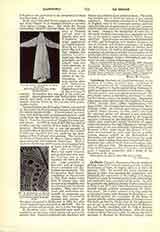

La Chaise (CHAIZE), FRANCOIS D’AIX DE, confessor of King Louis XIV, b. at the mansion of Aix, in Forez, Department of Loire, August 25, 1624; d. at Paris, January 20, 1709. He entered the Jesuit novitiate at Roanne in 1649; after teaching the humanities and philosophy for some time at the College de la Sainte Trinite at Lyons, he became rector of the same college and, somewhat later, provincial of his order. In 1675 he succeeded the deceased Father Ferrier as confessor to King Louis XIV, and filled this influential but extremely delicate position conscientiously for thirty-four years. He is often accused of having connived at the king’s liaison with Madame de Montespan, and of having advised the revocation of the Edict of Nantes and the violent suppression of Protestantism. The facts are that La Chaise used all his influence to put an end to the king’s illicit relations with Montespan and finally succeeded, with the help of Madame de Maintenon, in breaking the liaison. After the death of Queen Maria Theresa in 1683, he advised the king’s marriage to Madame de Maintenon, through whose influence the king and the whole court of Versailles underwent a wholesome change.
It is not known in how far La Chaise was connected with the revocation of the Edict of Nantes, but it is probable that, like most other Catholics of France, he advocated it. The accusation that he advised the use of violence against Protestants is without foundation, and does not harmonize with the admitted mildness of his character. Saint-Simon (Memoires, IV 285-7), Voltaire (Siecle de Louis XIV, III, 305), and other enemies of the Jesuits testify to his kindness and humanity. He corresponded with Edward Coleman concerning lawful means for bettering the sad condition of the Catholics in England; but a letter concerning the extirpation of Protestantism, alleged to have been written by La Chaise to Father Petre, the confessor of James II of England, has been proved to be a forgery. As a mark of esteem King Louis XIV presented him with Mont-Louis, a beautiful tract of land in the southeastern part of Paris. In 1804 it was converted into a cemetery, and it is still known as Pere La chaise.
MICHAEL OTT

